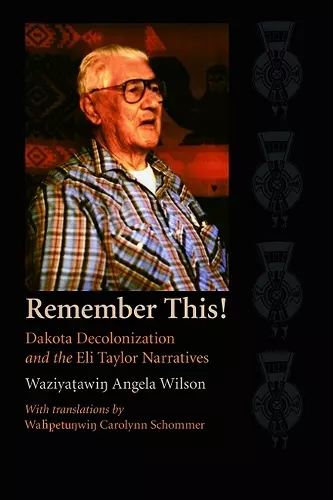Remember This!
Dakota Decolonization and the Eli Taylor Narratives
Waziyatawin Angela Wilson author Wahpetunwin Carolyn Schommer translator
Format:Hardback
Publisher:University of Nebraska Press
Published:1st May '05
Currently unavailable, and unfortunately no date known when it will be back

Oral history through a bilingual presentation and skillful analysis of the stories told by the Dakota elder Eli Taylor
Situating Dakota language and oral tradition within the framework of decolonization, this title aims to make a radical departure from other works in Indigenous history, because it relies solely on Indigenous oral tradition for its primary sources and privileges Dakota language in the text.Situating Dakota language and oral tradition within the framework of decolonization, Remember This! Dakota Decolonization and the Eli Taylor Narratives makes a radical departure from other works in Indigenous history because it relies solely on Indigenous oral tradition for its primary sources and privileges Dakota language in the text. Waziyatawin Angela Wilson, both a historian and a member of the Dakota Nation, demonstrates the value of oral history in this bilingual presentation and skillful analysis of the stories told by the Dakota elder Eli Taylor (1908–99). Taylor lived on the Sioux Valley Reserve in Manitoba, Canada, and was adopted into Wilson’s family in 1988. He agreed to tell her his story and to share his accounts of the origins, history, and life ways of the Dakotas. In these pages he tells of Dakota history, the United States–Dakota Conflict of 1862, Dakota values, and the mysterious powers of the world. Wilson gracefully contextualizes and complements Taylor's stories with a careful analysis and distillation of the narratives. Additionally, she provides an overview of Dakota history and a substantial critique of the use of oral accounts by mainstream historians. By placing Dakota oral tradition within the academic discipline of history, this powerful book illuminates the essential connections among Dakota language, history, and contemporary identity.
“Wilson makes a critical intervention in the study of Native histories by offering a model of how to decolonize our tribal histories that have remained the domain of non-Indian historians for far too long. She is also not afraid to raise questions about the ways in which we as Native people have internalized colonialist messages about what is Native, such as the use of our warrior traditions to uphold American imperialism. As a Dine historian committed to the decolonization of my own people, I find Waziyatawin Angela Wilson’s study a welcome contribution to the study of Native peoples.”—Jennifer Nez Denetdale, Western Historical Quarterly
ISBN: 9780803248144
Dimensions: unknown
Weight: 499g
282 pages